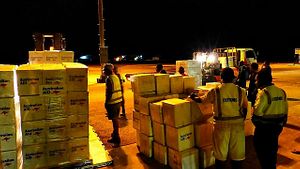Recently, a couple from the U.K., seeking publicity, were found to have fabricated claims of cannibals in Papua New Guinea. Meanwhile, many authors have identified and discussed sexual assault and accusations of witchcraft as the greatest threat to a stable PNG society.
The problem here is that these stories focus on individual symptoms rather than the underlying societal shortcomings. While programs put into place to treat these symptomatic issues at a low level are in no way malicious, international efforts would be better directed at the overall development of Papua New Guinea. Too often, international efforts seek to apply Band-Aid treatments designed to deliver short-term results that leave the donor with a feeling of accomplishment, but that fail to address broader concerns and allow a more developed society to rectify its own shortcomings.
Certainly, this has been the case in Australian military assistance to the PNG. In general, Australia is driven by fears of being seen as retaining a colonial mindset, and as such the aid that is offered is often ineffective. For instance, Australia donated Iroquois helicopters that were handed over to the PNG Defence Force (PNGDF) a number of years ago as part of a gifting program to enhance the capability of the latter’s Air Operations Element. Unfortunately, they were handed over without consideration given to maintenance or crew training, and today the PNGDF Air Operations Element consists of around 65 personnel with a couple of aircraft flyable at any given time and another handful stored in a hangar being cannibalized as scrap. The direct result of this decision is that now some three Iroquois leased to the PNGDF are being piloted and maintained by a third-party company and funded by the Australian government. With other aid efforts to the PNG following similar lines, it is obvious that the assistance strategy needs to be reorganized.
While Australian Defence Force (ADF) and PNGDF cooperation is executed to good effect at the lower level, the higher end consideration is often lacking. ADF personnel annually deploy to PNGDF locations to essentially refurbish facilities; with a limited number of PNGDF locations it is often the location of past projects. By the time a rotation returns to an area after two or three years, past works are more often than not crumbling around them. The PNGDF does not have the ability or finances to conduct its own maintenance or even pay its own power bills, so visiting Australians bring their own generators and send advance parties to evict squatters from accommodation blocks prior to the start of activities.
There have been reported concerns as to the accountability of PNG public officials and even concerns raised by some as to the allocations of funding. Past deployments of Australian Federal Police have been kicked out of PNG when attempting to switch from publicly visible policing to investigations of corruption.
Fears of being seen as a source of colonial oppression have resulted in an underequipped PNGDF that works only one day a week if lucky, rampant gangs committing acts of violence, an overwhelmed police force, and corruption at all levels. The an Australian public generally has little idea what is going on, even as the evidence of the country’s failures is apparent in the form of a number of luxury homes in Queensland purchased by anyone who has been able to source enough money to depart PNG.
The overall aid strategy needs to be reconsidered and remolded into a more effective model to ensure a stable PNG that is in itself capable of contributing to regional development in the wider South Pacific.
Chris Sheahan is a former Australian Army Officer who works as a security consultant for Ludus Resources Group. Follow him on Twitter @cj_sheahan.

































